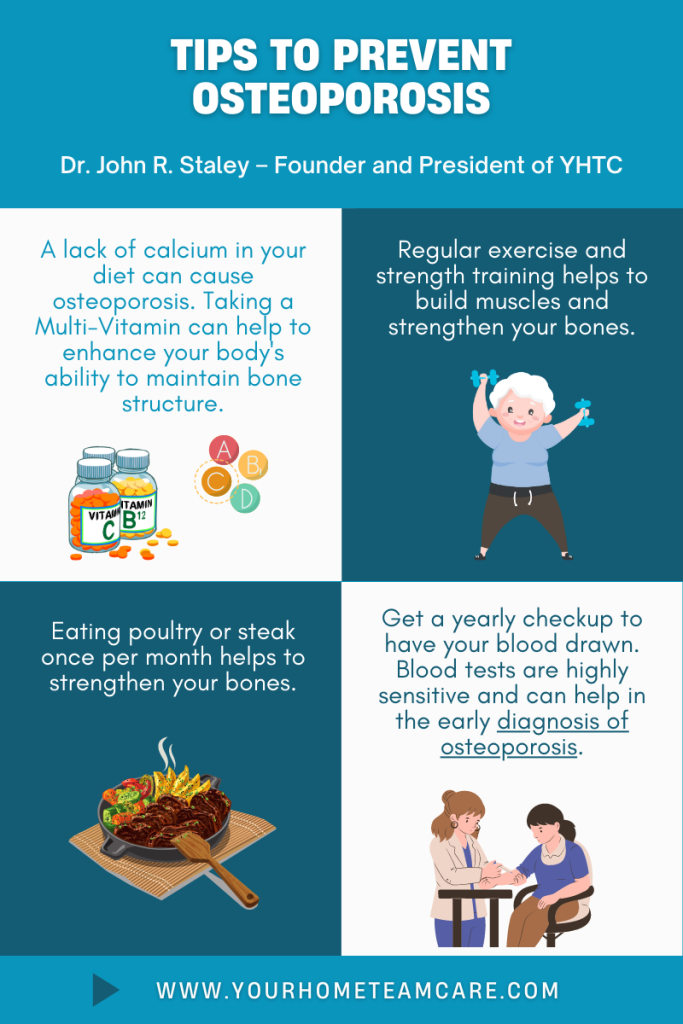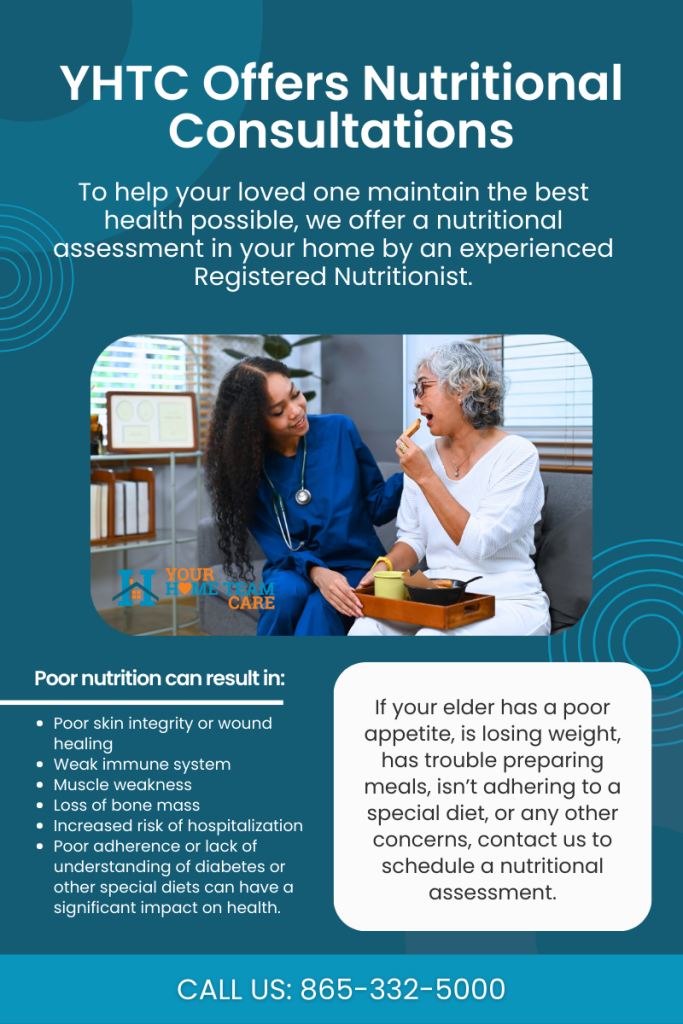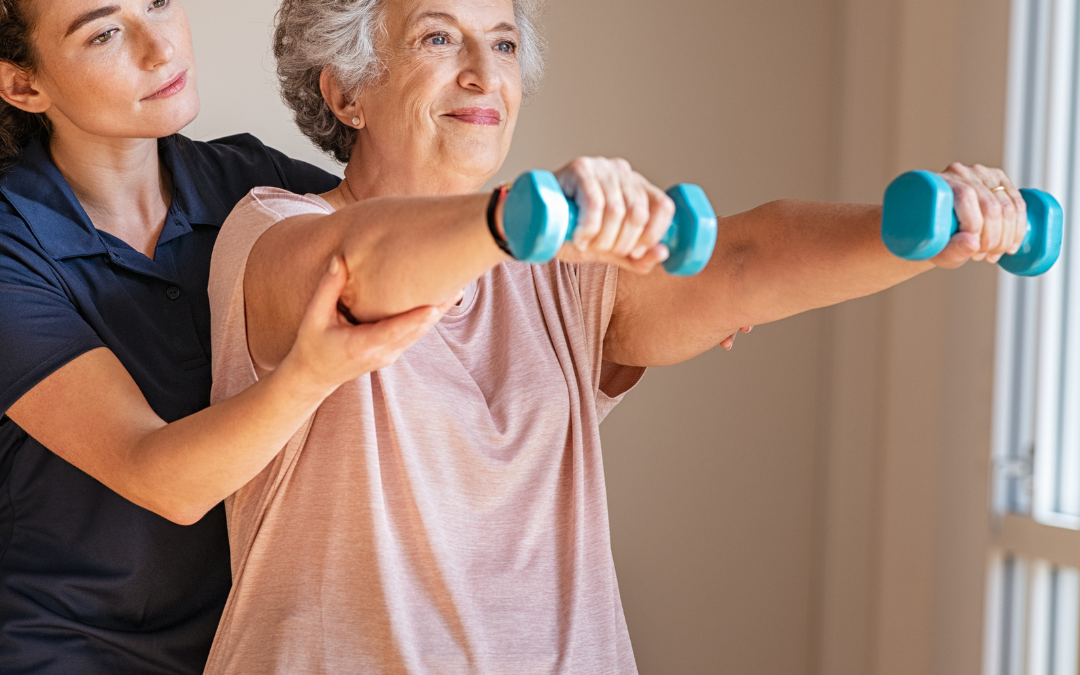In this blog post we’re sharing a few healthy aging tips for women to prevent two serious health issues: stroke and osteoporosis. Women are usually at a higher risk than men when it comes to health issues.
These health conditions include: stroke, osteoporosis, high blood pressure, cancer, Alzheimer’s disease, heart disease, arthritis and obesity. It is important for women to properly take care of their health as they age, in order to prevent many of these life-threatening diseases. At YHTC, we want all seniors, especially women to live a healthy lifestyle that allows them to be as independent as possible in the safety of their own home.
Bone Health: Myths About Osteoporosis
“Osteoporosis is a very threatening problem for the elderly due to the wear and tear of their body from age.” Dr. John R. Staley. It seems strange that with all of the information available about osteoporosis, there are still so many people that are misinformed.
One such myth is that osteoporosis is an inevitable part of aging. This is highly untrue. In fact, osteoporosis is completely preventable with a healthy diet and exercise. By promoting and practicing good bone health, your chances of getting Osteoporosis are greatly reduced.
Another such myth is there isn’t much you can do for your bones after the age of 20. It is true that you form about 90 percent of your bone density by the age of 20 but good bone health must still be practiced. Also, you can still do a lot to improve your bone health despite your age. Even people with osteoporosis can make great improvement in their bone condition with a good diet and medical attention. It is never too late to get started
Finally, osteoporosis is a disease that is mostly associated with older women. While it is true that older women past 50 account for a large number of the cases. This disease can attack anyone. If someone is an asthma sufferer, they can be more susceptible to osteoporosis regardless of age or sex.
To avoid osteoporosis and other bone diseases, start practicing good bone health habits. They sooner you start the better for your overall health.
Bone Health: Prevent Osteoporosis Through Exercise and Natural Remedies
All of us have most likely seen a martial arts film on late night television. We often wonder if the stunts they do are real or just clever camera tricks. How does a person put their hand or foot through boards or concrete without shattering every bone? The truth is, these guys can do it for real. There is a combination of reasons. They are very focused, have been training for a long time and have incredibly strong bones. Martial arts experts have very strong muscles however their bones structures have grown along with them. When bones receive an impact, they actually grow harder and stronger. This, done correctly over time makes bones nearly shatterproof.
One does not have to go to these extremes to have good, healthy bones. Regular exercise goes a long way to making our bones strong and healthy. Resistance exercises such as weights actually stress the bone tissue in a good way. This actually helps new bone tissue to grow. If weights are not your favorite form of exercise, then relax. Cardio vascular exercises also help create new bone growth. Exercises such as jogging, cycling and aerobics are perfect for your bones as well as your overall health.
There are several dietary choices that we can make to improve our bone health. Eating dairy products that are rich in calcium help to nourish our bones and keep them strong. It is also best to avoid smoking, alcohol and food rich in sugar. These foods and vices can actually deplete bone tissue and increase your risk for osteoporosis.
By regular exercise and a good diet our overall health will be good, especially our bones. This will help to reduce injury and prevent osteoporosis.

Stroke Awareness: What You Need To Know
A stroke is found to occur due to narrowing of blood vessels, bleeding occurring inside the brain, and blood clots. All these reasons are primarily responsible for blocking the blood flow towards the brain. As the essential nutrients do not get supplied to the brain, the nerve cells of our brain start collapsing away within a span of few minutes. When it comes to strokes, there are two types: ISCHEMIC & HEMORRHAGIC
Transient Ischemic Attack:
A transient ischemic attack (TIA): It is a temporary phase which might cause ischemic stroke in some. In a TIA, though an arterial obstruction is formed in the brain, it gets resolved on its own without any permanent tissue death. But it is seen that 40% of patients with TIA history will suffer a stroke in future and in 10% cases a TIA was always followed by an ischemic stroke.
Hemorrhagic Stroke:
Hemorrhagic strokes occur due to the bleeding caused by the rupture of blood vessels in the brain. As a result of this the oxygen supply to the surrounding tissues are cut off, which in turn results in stroke. It can be life threatening as it severely affects a large portion of the brain.
“It is important that seniors are aware that they need to be healthy in order to avoid a life crippling stroke.” Dr. John R. Staley, Founder and President of YHTC.
Consequently, the effects of a stroke can be sensory loss as well as loss of vision, problems with talking and walking, as well as difficulty to think clearly. These stroke effects are often found to be irreversible.
The vulnerability towards a stroke varies from one individual to other. Stroke risk is increased by:
• Chronic health problems such as diabetes and unfavorable blood.
• High blood pressure
• Smoking cigarettes, drinking excessively or being overweight.
• A stroke history in their family
• African-American ethnic belonging.
If someone has already suffered a stroke in the past or had a transient ischemic stroke (“mini stroke or TIA), he/she is at the highest risk.
Warning Signs Of A Stroke
Not everyone that suffers from a stroke shows all of the signs & symptoms of a stroke. Remember that these warning signals of a stroke might not remain forever; as they can appear and disappear at any time. It is advisable that anyone with any of these symptoms should seek immediate medical aid.
Time factor is also crucial in the treatment of strokes. The earlier the treatment the better will be the chances of recovery.
Some of the most common and notable symptoms of stroke include
• Unexpected numbness or weakness of the leg, arm or face at only one side.
• Unexpected problem in vision or dimness in a single eye only.
• Facing troubles while talking, devoid of speech r loss of understanding about what has been said by others.
• Severe headache without any identified reason.
• Falling, unstable walking, and sudden dizziness accompanied by any other symptom.
A transient ischemic attack or TIA is also recognized as a warning sign. Known as ‘mini-stroke’ it can also lead to the above-mentioned symptoms. Though it may be for a few minutes, but this should definitely be taken seriously as it does increase the threat of stoke at a later stage.

Steps To Prevent A Stoke
The following preventative steps were supplied by Dr. John R. Staley – Founder and President of YHTC. It is advisable to consult with your doctor to discuss the risk factors that can causes strokes to occur and how this possibility can be reduced. A few things you can do to avoid having a stroke are:
• Check your blood pressure daily. For Women over the age of 50, their blood pressure should be properly maintained. If it increases, the stroke risks also increases by 4-6 times. 120/80 is the safe mark for a blood pressure reading. Take action if it goes above this and if it has reached 140/90, its time for some immediate and serious action.
- (Here is a simple grade for your systolic reading: 120 – A, 130 – B, 140 – C, 150 & above – dangerous)
• Manage your weight properly.
• Exercise regularly. Walking for 40 minutes a day is a simple way to stay active. Even working out 3-4 times a week ensuring that you burn at least 500 calories, can help keep your body healthy.
• Control the levels of sugar in your blood, if you are a diabetes patient.
• Avoid the consumption of food that have high cholesterol, fat or sodium content to control your blood pressure and cholesterol.
• Women over the age of 60 should check with their doctor to see if they can be prescribed Baby Aspirin
• Fruits and vegetables are generally a good help in nutrition. Blueberries and blackberries tend to lower blood pressure.
• Smiling and having a hearty laugh each day can extend your life span. Laughing uses less muscles and it lowers your blood pressure.
• Reduce your anxiety. Thinking positive thoughts daily is a great way to reduce your stress levels. Taking 10 minutes each day to meditate and focus on where you are – where you were – and where you want to go, can help you to be more mindful and ease anxiety. It also helps if you have something in your life that you are passionate about, whether it’s a hobby, or activity.
• Avoid smoking and alcohol consumption.
If it seems difficult for you to make these changes in your lifestyle, talk to your doctor to guide you better. Ask him if taking small doses of aspirin (a drug that avoids the transformation of blood clots and ensure flow of blood) can be of any help.
Last but not least, regular check-ups are necessary to ensure that you are in good health and to identify any of the above-mentioned symptoms without any delay for effective treatment.
According to the Stroke Awareness Foundation “In the United States, about 795,000 people suffer a stroke each year. Someone has a stroke every 40 seconds, and every 4 minutes someone dies from stroke. There are more than 140,000 deaths each year from stroke. Statistics show that about 40% of stroke deaths occur in males and 60% in females.”
Stroke can occur in men and women alike however the mortality rate in women due to stroke is more than in men. Ischemic stroke is more common in aged people over 65 years while younger people are more susceptible to hemorrhagic stroke.
At YHTC we provide seniors with nutritional consultations in your home by an experienced Registered Nutritionist. If your elder has a poor appetite, is losing weight, has trouble preparing meals, isn’t adhering to a special diet, or any other concerns, call us at 865-332-5000 to schedule a nutritional assessment.

